Short Stories
Profile
Published works
New works
Short Stories
Poetry
Friends & Family
Reviews
Buy Books
Links
Contact
Site
Map
|
Grandad One Man's Story of the
Boer War |
||
|
May 31st 1900, it was. Me and Ernie Marks walked into the Foregate Street recruiting office together. Living out Shrawley way we was then. Old Kruger and the Boers had been giving our lads a rough time. Me and Ernie decided we'd give 'em a hand. Straight away they sent us down to Pitchcroft to see if we could ride a horse. Bit of alright that was. Me and Ernie had been brought up with horses. Still they put us through the hoop. Over the jumps, parading, turning, mounting and dismounting. We managed that bit so they sent us out to Malvern to see if we could use a gun. That was a laugh. When your daily meal may depend on how good you are at potting rabbits you sort of develop a keen eye. |
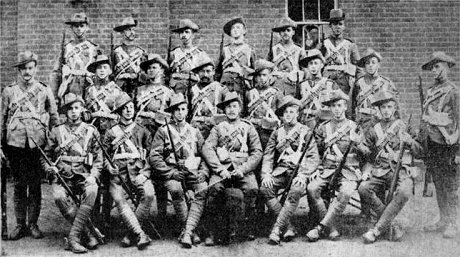
Stalwarts of the Worcestershire Yeomanry in barracks at Aldershot prior to going to South Africa to take part in the Boer War. Bill Oakey is in the back row, extreme right, and Ernie Marks centre row, third from right
|
FULLY
ENLISTED Three weeks from the day we enlisted we were on our way to South Africa aboard the SS Orotava. Even on board ship our training continued. Every day they had us lying on the deck shooting at tin cans in the sea. We were supposed to land at Capetown, but when we arrived a plague was raging and we had to go on round the Cape to Durban. From Durban we moved directly to Johannesburg. Lord Roberts had captured Johannesburg on the very day we enlisted. The major war against the Boers was ending, but though we didn't know it , a new kind of war was just beginning. Under General Christian de Wet the Boers adopted a commando style of fighting. From nowhere they would attack and then vanish. Never retreating as a group but in ten different directions, which made chasing them blooming hopeless. FLYING
COLUMNS Start in the early morning with three biscuits, hard as leather. One tin of 'bully' beef between four of us, and a swig from our canteens. From then on we rode all day, walking occasionally to rest the horses. At night same meal. Then scrape a hole in the ground, called a 'redoubt', fall in and go to sleep. Six months at a ruddy stretch we had this lark. And many a night we'd have no sleep because some blinking fool thought he heard the Boers. Mind you, occasionally the Boers really were there. Then you'd roll over and shoot at anything that moved. Six months of this game and we really were fed up. Fed up? Crikey! That's nothing to what we were when we joined up with Lord Methuen. Three thousand strong we were when we met the Boers led by the famous Christian de Wet. They ran like hell and we chased. For three long weeks we chased de Wet across the African veldt. |
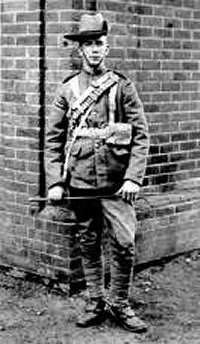 |
READY TO
DROP Nobody was ruddy happier than I was when de Wet made for a place called Oliphants Nek, a pass over the Magaliesburg Mountains. I knew, as did everyone else, that Lieutenant Ian Hamilton, commanding a regiment of Infantry, Cavalry and artillery was guarding the only exit to Oliphants Nek. You may imagine how we felt when we saw de Wet and the Boers ride straight through the pass untouched! We discovered later that Hamilton had tired of waiting and gone home. Lieutenant Hamilton was a brave and gallant officer, but not to us on that particular day. |
|
Two days rest and then back to the 'flying columns'. In those days when a column fought a rearguard action three men would dismount, dig in, and hold off the pursuers. The column would continue for a mile then three more would dismount and dig in. The man chosen as 'number four' would take three horses and gallop back to the first three, get them mounted and rejoin the column. The process was then repeated. I got caught for that 'number four' routine once. The first and last time it was. Galloping back to the three men a Boer sniper shot my horse from under me. We rode double back to the column. Once back with the column riding double was forbidden. If you lost your horse that was your fault. 'Flying Columns' never carried remounts. If you wanted to stay with the column you hoofed it. Twenty-five miles I walked/jogged that day. "Oakey" I thought, "This won't do mate. You got to get a horse." That night we camped near a company of the 17th Lancers. I wandered over. When I got back my company commander glanced at my new mount, "Stray, Oakey?" "Yes, sir." "Good man." With the barest trace of a smile he rode on. In those days officers weren't only gentlemen, they were ruddy fine soldiers as well. No languid lilies but strong fighting men. I always remember one day on patrol when a Boer sniper opened up. Two of my mates he killed and one he shot through both cheeks. Funny that was because this bloke had his mouth open at the time and the bullet passed straight through without touching his teeth! There is something cowardly and gutless about sniping. Our officer at the time got damned annoyed with this sniper so he slid off his mount and ran into the rocks around us. A few minutes later the sniper stood up shaking with fear with his hands upraised and screaming "Kamerad!" He couldn't take his own medicine. Without hesitation our officer shot him and returned to the column. I must have been staring because the officer glared at me, "You got something to say, Oakey?" I shook my head. It wasn't an atrocity, just an economic answer to the simple problem of a man who hadn't the guts to fight in the open. PARADISE We met Zulus and the mighty Impala. Basutos and the Swazis. We saw the tin shanty towns of Ladysmith and Mafeking. Looking at the meagre tin huts we wondered what all the fuss had been about. For two years we fought the Boers and feasted our eyes and hearts on the beauty of South Africa. Many are the tales that I could tell of the Boers of South Africa and of the Worcestershire Yeomanry. But, for me, after the savage splendour of a continent the rich peacefulness of Worcestershire was like simply 'coming home'. |
|
Additional
Information: 1) Please visit the Worcester City Museums for information on the history of the Worcestershire Yeomanry 1794 - 1899 and the Worcestershire Yeomanry Cavalry during the Boer War 2) The following information about Bill Oakey's participation in the Boer War was kindly provided by Gary Whitley: His number was 20935 and he served as a Private in the 16th Squadron (Worcestershire) 5th Regiment, Imperial Yeomanry. He went to South Africa with the second contingent and served there for 1 year 196 days. Although the strange thing is "Bill" says he went to South Africa in June 1900 whereas the 2nd contingent of the Worcestershire Yeomanry did not go out until February 1901. However, I feel sure that it is the same man as the address he gave on enlistment was Church Cottage, Shrawley. His pal "Ernie" J. Marks, who's number was 20932, later became a Lance-Sergeant in the same unit. For details of the campaign see the book "The Yeomanry Cavalry of Worcestershire 1794-1913" by Q.L. privately printed in 1914. (Bill gets a mention on page 161) 3) Further information kindly provided byGary Whitley, taken from WO 128 55 Public Records Office (His Short Attestation Papers): 20935 William Oakey Imperial Yeomanry Born 1879 in the Parish of Shrawley, near the Town of Stourport in the County of Worcestershire. He was the son of Samuel Oakey of Church Cottage, Shrawley, Stourport. On the 26th January 1901 at Worcester he enlisted into the Imperial Yeomanry for one years service with the Colours. (I think the date he gave, May 31st 1900, was the date he offered his services and they said go home we will send for you when we want you). On enlistment he gave his age as 21 years, 5 months and his calling as Baker. He was 5ft 10ins tall, weighed 155lbs, had a fair complexion, grey eyes, light brown hair and a chest measurement of 35ins. He gave his father Samuel as his next-of-kin and his religion as C of E. He served as follows:
He was discharged at Aldershot on the 15th September 1902, his conduct was described as very good and his intended place of residence as Church Cottage, Shrawley. He served in South Africa with the 16th Company 5th Regiment I.Y. (Worcestershire Yeomanry, second contingent). For his services in South Africa he was awarded the Queens South Africa Medal (the Boer War Medal) with 5 clasps - Cape Colony, Orange Free State, Transvaal, South Africa 1901 & South Africa 1902. His papers for World War One like many others are missing, they were probably destroyed during the Blitz. However, his M.I.C. (Medal Index Card) shows that he served with the Military Mounted Police (this is the only unit shown) with the number P/8135 and the rank of Lance Corporal. He was entitled to the British War Medal and the Victory Medal which means that he did not serve in a theatre of war until at the earliest 1916, otherwise he would have been entitled to either a 1914 Star or a 1914/15 Star. |
|
Worcestershire
Constabulary - 'Life was a Lusty, Brawling Wench…' |
||
|
July 4th 1904, and I joined the Worcestershire Constabulary. Three months training on the beat in Worcester then a posting to Moseley. In those days Moseley was a semi-rural area on the outskirts of Birmingham, but still in Worcestershire. |
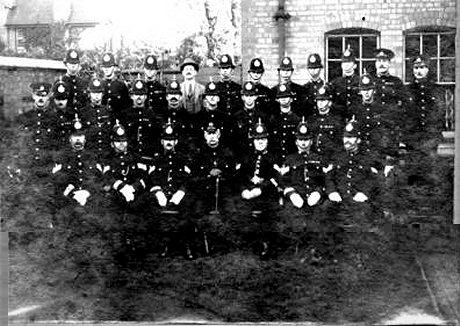
Bill Oakey is in the back row, third from right
|
I remember my first sight of the old steam trams that puffed and clanked through Birmingham. I soon discovered that if you sat on the top you came off like a nigger minstrel. Being on the outskirts of Birmingham gave me a chance to get acquainted with the rough, tough industrial worker of those days. The times were hard and so were the men. To command their respect you had to earn it the hard way, with your fists. |
|
Many of today's districts of Birmingham were once part of Worcestershire. Moseley, being semi-rural, was regarded as a sort of training school for the tougher areas of Birmingham. Believe me, I was glad of that training. In 1906 they moved me to Hay Mills. Hay Mills was a part of Worcestershire until 1911, when it was annexed by Birmingham. It was a growing industrial area which had many of the qualities of a gold rush mining town. |
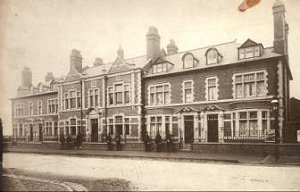
Hay Mills Police Station |
|
Every night the gas lamps flickered and hissed as the pubs spewed their nightly quota of belligerence and raucousness on to the streets. HANDY WITH
FISTS Sergeants Fidler and Muller were my superiors and two straighter or tougher men I've yet to meet. I remember one local troublemaker coming into the station one morning. "I want to make a complaint," he said. Sergeant Fidler nodded. "I was assaulted by a copper last night in Deakin Road." Sergeant Fidler's eyes narrowed. One ham-like hand reached out and grasped the man by the coat. The poor bloke was yanked forward and found himself staring into the sergeant's eyes. Sergeant Fidler's voice growled, "So?" We never saw the man again. The tolerance of our tough attitude didn't stop at sergeants, it went right to the top. One day, about a week after I'd jailed a bloke, his brother stopped me in the street. "If you didn't have that uniform on I'd knock your bloody head off." I nodded, "Right," I said. "Meet me in Fordruff's Timber Yard at 6.30 and we'll see about that." We met. He didn't knock my head off and we were the best of pals. But coming out of the timber yard, still pulling my jacket on, I walked smack into Inspector Millson. The Inspector glanced at my battered face and grinned. "One of these days Oakey you're going to pick a wrong 'un and get your ruddy nose bent." Without another word he left. TOUGH
MEASURES I remember being held down by three blokes, while a fourth put his boot into my ribs. I never forgot his face. A few weeks later I saw him walking along the Coventry Road. I crossed over and deliberately jogged him with my elbow. I pinched him for assaulting a police officer. He got two months. That was justice. Rough but straight. Mind you, life certainly had its lighter moments. I'll never forget the day we went on an outing to Stratford-on-Avon Mop. There were no cars so we went by charabanc. Four horses and an open carriage with benches on either side. Bitter cold it was and ice on the roads. If we hadn't stopped at every other pub we'd have frozen to death. Old Fred Paynter drove. The reins in one hand and a bottle of rum in the other. We had a marvelous day. What with the pubs open all day and Inspector Fred Amphlett and me knowing all the showfolk we hardly spent a penny. Round Hay Mills the showfolk had permanent fairgrounds from which they travelled to places like Stratford. Mr. T. Clark, known always as Old Man Clark, ran the fairgrounds in those days: a young lad called Dick Chipperfield worked for him then. We knew them all. As always the fairground showmen were warm-hearted and generous. For the kids nothing was too much trouble. If ever a child was shortchanged on a side show, and complained, Old Man Clark would be round like a shot. No argument. The man responsible would be sacked on the spot with no pay. If he felt disposed to argue, a quick belt around the ear from the old man would change his mind. The kids were never cheated. The journey home from the Mop was a rather hazy affair. I do know that the cold seemed to have lost its snap, or perhaps it was just the warm glow that came from inside. It was fortunate that the horses knew their way back home! One day in 1911 we were dispatched post haste to Droitwich. Apparently a local election had been held and the Conservative candidate elected. In the Liberal stronghold of Droitwich this election sparked off a riot. For the first time in my life I heard the 'Riot Act' being read. A Mr. Jackson Gabb read the Act, his voice booming out over the noise of the rioters. As soon as the Act had been read and the rioters warned of the consequences, we moved in, truncheons swinging. Within minutes the riot was over. Apart from a few broken bones and sore heads casualties were slight. Except for a short break between 1914-18 when we put the Kaiser straight on a few points (again in the Worcestershire Yeomanry). I spent most of my life in the police force. A career eventful, and exciting enough for any man. GENERAL
STRIKE Young students drove all the trams and lorries. If a pretty girl got on a tram the fare was invariably a kiss or nothing. The occasional oddly bent and twisted gas lamp testified to the enthusiastic but unskilled aim of the young drivers. During the strike I was on night duty at the railway goods yard of Tyseley. I remember one night a train driver trying to get to work through a picket line of about six men. They beat him up and threw him out. He came to me. Together we went back . Between us we wiped the floor with all six. The driver went to work every night from then on. We had our share of parades and demonstrations much the same as the police do today. Only difference is we weren't so gentle and we cleared 'em a lot quicker. SIT
DOWNS It's funny looking back. The times were rough and turbulent, but never without humour. Life was simple and uncomplicated. You loved and laughed, drank and fought just for the sheer exhilaration of living. As long as you were honest and never afraid to stand up for what you believed in, then life was good. |
|
William 'Bill' Oakey: 1879-1967 |
||
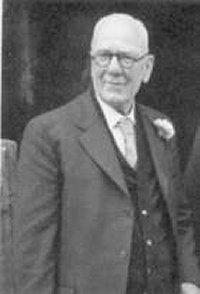 |
One small detail he neglected to
mention is that his idea of entertainment was to be found in the Hay Mills
fairground boxing booth where, having beaten the resident champion several
times, Old man Clarke took him on to face all-comers and his reputation was
legendary; villains who thought they could legally give a copper a good hiding
quickly discovered the cost was too high! In those days boxers wore what were
no more than kid gloves and the injuries, whilst not fatal, were extremely
painful.
Only two anecdotes survived from WW1: They were camped close to a Scots Guard battalion who had a much prized goat as a mascot. |
|
|
The Brits had fed on little but hardtack and bully-beef until Grandad and a couple of friends provided them with a delicious stew that left everyone happy and replete. When, the next morning several Scots Guards came around asking if they’d seen a goat, it was to their eternal credit that no one smiled or burped. On the Somme, Grandad was attached to the mounted Military Police to keep one access from the frontline open at all times. There were three tracks into and out of the Somme frontline, the two outside for ferrying troops and artillery in and the middle one to bring out the dead and the wounded. On this occasion an officer was driven down the middle track and granddad simply rode his horse into the middle causing the driver to brake sharply. The officer immediately leapt to his feet and demanded to be let through. Grandad, quite reasonably explained that this was an exit lane only and the gentleman would simply have to go back. The officer turned purple with rage and shouted, “Don’t you know who I am, I’ll have you court-martialed for this. Let me through immediately.” Grandad drew his revolver, pointed it at the Captain, cocked the trigger and said, quietly, “This lane is for the wounded and the dead, would you care to join them because it’s the only way you’re going to use this lane.” With the officer still protesting vigorously, the driver, who didn’t like the look in Grandad’s eye, carefully backed the staff car back the way he’d come. Needless to say Grandad heard nothing further about the incident. When asked later if he would have shot the officer he calmly answered “Yes.” Also see the poem "A Tribute to My Grandfather" |

All
rights reserved. Reproduction in whole or in part in any form or medium
is
prohibited without the express written permission of Frederick Covins.
All
photographs and illustrations on this page are believed to be
in the public
domain, but if not please e-mail